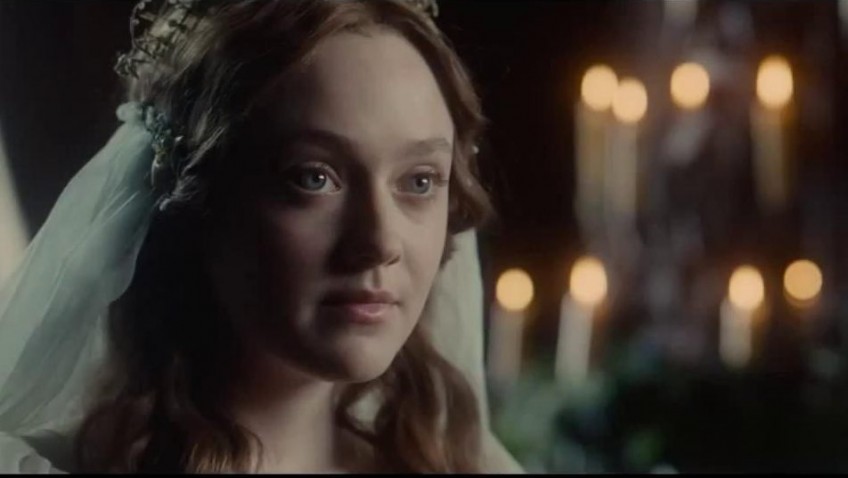Effie Gray (October 10, 2014) Cert. 12A, 108 mins.
Richard MacCormac’s architecturally striking, anti-Victorian, oval-shaped Ruskin Library at Lancaster University, home of the Ruskin collection, is one of dozens of public buildings and schools named after John Ruskin, arguably the foremost writer, arts critic and intellect of the Victorian era. Ruskin was a champion of JMW Turner when others didn’t “get him” and of the Pre-Raphaelites whom leading Academicians and artists not only ‘didn’t get’, but despised. But as director Richard Laxton’s film Effie Gray shows, sex with his beautiful 18-year-old wife was something that Ruskin “didn’t get.”
Emma Thompson’s script turns her real-life husband, actor Greg Wise into a sexually repressed monster and gives his marriage to Effie Gray (Dakota Fanning) the flavour of a Gothic horror novel. But within minutes and a merciful lack of narration, the story is anti-climactic. And despite the engrossing premise, the film adapts the sluggish pace of a drama with nowhere to go.
Although he never had children and expressed disdain at large families, Ruskin wrote about education, and was attracted to pretty young girls whose pre-pubescent bodies looked like the porcelain creations he loved to sketch. He even wrote a fairy tale. This is alluded to the film’s only off-screen voice-over, when Effie walks through a garden reciting the tale of how she came to marry Mr Ruskin. As the narration is sketchy, those unfamiliar with the biographical details will be left wondering how a working-class girl from the Scottish Highlands with nine siblings ended up marrying an Oxford-educated only child living with his wealthy, doting parents in Denmark Hill, London.
From the moment when Ruskin brings his bride home, Effie is made to feel like an intruder in a closed-knit family. When Ruskin’s mother (Julie Walters) rushes off with her newlywed son, the butler explains: “she couldn’t wait to lay her hands on him for his bath.” When he coughs at dinner, his mother gets to him before Effie. If Effie is comforting herself with the thought that she will have Ruskin to herself in the bridal chamber, she is mistaken here, too. Upon seeing her naked body, Ruskin simply walks out of the room.
With maids to mend, cook and clean, and her husband occupied all day in his study (where Effie, a talented artist herself, is not welcome), Effie’s dreams of running a household and raising their children are quickly dashed. An amazingly perceptive Mrs Charles Eastlake (Emma Thompson), wife of the President of the Royal Academy (Edward Fox), who turned around her own arranged marriage, takes a liking to Effie. Effie then tells a horrified Mrs Eastlake her secret.
We get the picture. Nothing changes in the romantic city of Venice where Ruskin sends his wife off to balls and sight-seeing with a handsome, young Italian count while he writes The Stones of Venice. Ruskin tells Effie that his book is urgent as the Prussian occupation of the old city is endangering the precious stone ornaments and buildings. Since there is evidence that it was a Prussian officer whom Ruskin chose to distract his wife while he worked, it seems strange that Thompson ignores this irony by making Gray’s companion an Italian.
When Ruskin’s father (David Suchet, excellent) pays up-and-coming Pre-Raphaelite artist John Everett Millais (Tom Sturridge) to paint his son’s portrait, Ruskin seizes the opportunity to combine a research trip to the Highlands with a doctor-ordered rest cure for his ailing wife. True to form, Ruskin rents a Spartan one-room cabin where Millais and Effie are left alone while Ruskin’s goes off on business. When Millais objects to this impropriety, Ruskin apologises, believing the amorous Millais will be bored in his wife’s company.
Although, at 48, Wise is some twenty years older than Ruskin was when he married Euphemia Gray, he is a dead-ringer for the older Ruskin, with his muttonchop side burns and handsome, but stern face. Wise’s performance is solid, but we miss some nuance to suggest that he was more comfortable with the artistic community than with his wife. American actress Dakota Fanning manages, if not a Scottish accent, then to show a progression from a stubbornly devoted wife proud of her husband to a strong-minded, though terrified, victim determined to escape a childless, loveless marriage.
The pace picks up with the arrival of Travers Twiss, Effie’s lawyer, at the end of the film, but you cannot help but think that the filmmakers have missed the real story. The real drama begins where this film ends, with a scandalous trial, a much older Ruskin’s engagement to 18-year-old Rose La Touche, and the Victorian establishment’s lifelong punishment of Effie: a working-class girl who dared to humiliate a respected pillar of society.
Joyce Glasser – MT film reviewer




